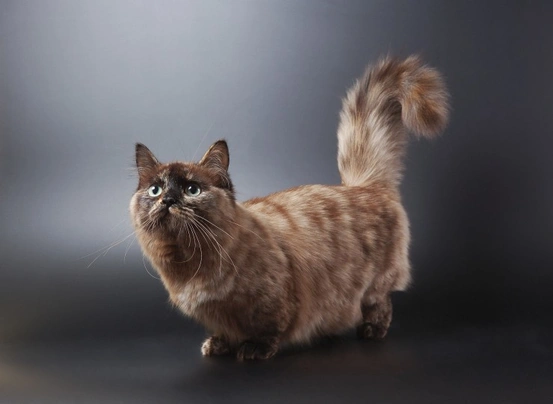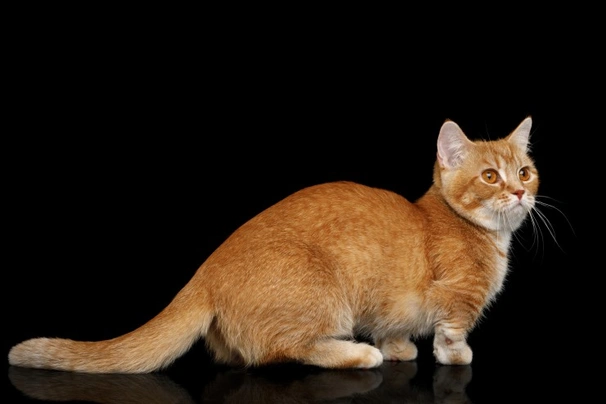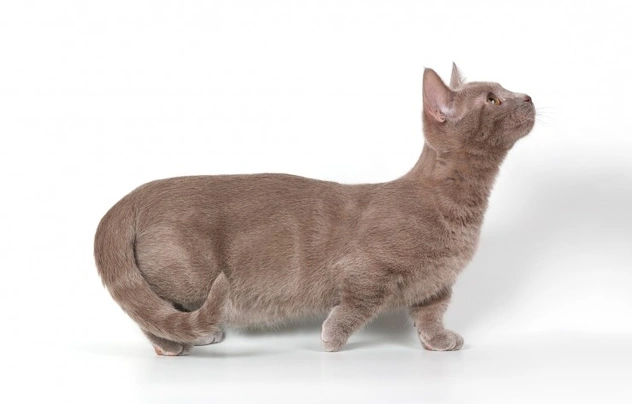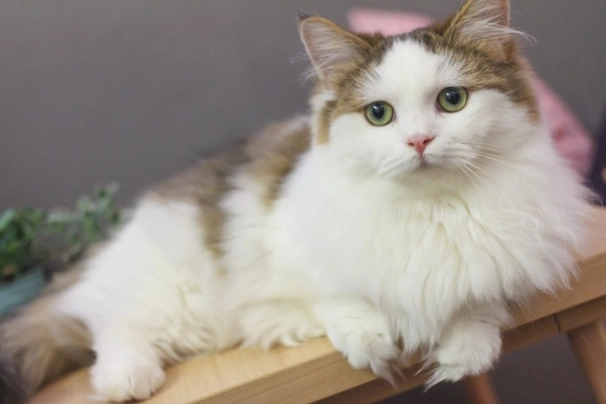Munchkin
Introduction of the Munchkin
Munchkins are known for their sweet appearance, energetic nature, and surprising speed during play. These confident and sociable cats thrive in human company, forming strong bonds with their owners. They enjoy interactive games and love being in a home environment. Given their need for companionship, Munchkins are best suited to families where someone is often at home to keep them company, ensuring they feel loved and cared for.
Important to note, that Munchkin cats are born with a genetic mutation that results in abnormally short legs and an elongated spine, a condition known as chondrodysplasia or disproportionate dwarfism. This defect places strain on their skeleton, making them prone to limb deformities, chronic arthritis, and reduced mobility. As a result, many Munchkin cats experience long-term discomfort and require ongoing veterinary care to manage their health and ensure a good quality of life.
History of the Munchkin
The genetic defect that causes the Munchkin’s characteristic short legs, a form of dwarfism, can occasionally occur as a spontaneous mutation. However, in the 1980s, cats with this mutation began to be selectively bred to produce more short-legged cats. Due to significant ethical concerns, the Munchkin breed was initially excluded from cat shows and competitions for many years.
Many breed registries worldwide continue to refuse recognition of the Munchkin due to concerns over their health and welfare. The UK’s main cat breed registry, the Governing Council of the Cat Fancy (GCCF), has deemed the breed “unacceptable,” citing that it is based on “abnormal structure or development.” Currently, the International Cat Association (TICA) is the only major registry that accepts Munchkins into its breed register.
In addition to lack of recognition, several countries and regions have imposed restrictions or outright bans on the breeding and ownership of Munchkin cats due to welfare concerns. For example, in 2014, the Netherlands prohibited the breeding of Munchkins, and similar restrictions exist in Victoria, Australia. The government of the Australian Capital Territory has classified Munchkins as “malformed animals” and considers their deliberate breeding “unacceptable” due to the genetic health problems associated with the breed.
Munchkin crossbreeds, such as the Bambino, have also faced legal restrictions in certain regions, further highlighting the growing ethical and welfare concerns surrounding this breed.
Appearance of the Munchkin
The Munchkin is a small to medium-sized cat with short legs and a long spine. They can have either short or long coats, both of which are accepted by the TICA breed standard, and come in a wide variety of colors and patterns. However, due to ethical concerns surrounding their breeding, the UK’s main breed registry GCCF does not recognise this breed.
Male Munchkins are typically slightly larger and heavier than females, and some may have longer hind legs, creating a subtle slope in their back. Munchkins suffer from an autosomal dominant mutation deliberately bred into the breed through selective breeding. This mutation causes a form of dwarfism called chondrodysplasia, which significantly affects their mobility and health.
Physically, Munchkins have almond-shaped eyes that are well-spaced and slightly angled toward the base of the ears. Their eyes, which are expressive and alert, can be any color and do not need to match their coat. They have firm chins, moderately long, well-defined muzzles, and sometimes prominent cheeks, all in proportion to their head. Viewed in profile, Munchkins have a slight stop with a flat forehead. Their necks are muscular, more so in males than females, and their bodies are semi-foreign in build, with well-rounded chests, firm hips, and a gentle upward slope from the shoulders to the tail. Their legs are short but well-spaced, with the upper and lower legs of equal length. Compact, rounded feet are proportional to their body, and their tails, which taper to a rounded tip, are carried high when they move.
In terms of coat, short-haired Munchkins have semi-soft, shiny fur with a moderate undercoat, while long-haired Munchkins boast flowing, silky fur with a moderate ruff and feathered tails. Females tend to have a more ruffled coat than males. Both coat types are weather-resistant, and the breed’s fur is either referred to as MK for short-haired cats or MKL for long-haired ones. All coat colors are accepted under the TICA breed standard.
Temperament of the Munchkin
Munchkins form deep bonds with their owners, making them quite demanding. They dislike being left alone for long periods and are better suited to households where someone is often at home to provide company. These cats love being involved in their environment and will happily follow their owners from room to room, eager to stay close and observe what’s happening.
Unfortunately, the mutation that causes their short legs significantly impacts their mobility. Leg deformities can often lead to chronic pain and limited activity, which may explain their calm and placid demeanour rather than an inherently relaxed personality. Due to these limitations, Munchkins may struggle to groom themselves effectively, particularly those with long hair, and will require regular assistance to keep their coats clean and tidy.
Intelligence / Trainability of the Munchkin
Munchkins are highly intelligent cats that quickly learn new skills, such as finding creative ways to reach high vantage points or opening cabinets to explore what’s inside. They can also be trained to perform various tricks, including playing "fetch," a game they particularly enjoy and can engage in for hours. These affectionate cats thrive on being close to their loved ones and are known to follow their owners from room to room simply to stay near them. Their intelligence also means they are adept at figuring out how to grab their owner’s attention, making them charming and engaging companions.
Children and other
As with all cats, care should be taken when young children are around Munchkins. Interactions should always be supervised by an adult to ensure calm and safe behavior. It's also important to teach children how to interact appropriately with cats, understanding when to give them space. Proper socialization during the critical kitten stage, between 2 and 7 weeks of age, is essential for a well-adjusted and confident cat.
Munchkins often live with chronic pain due to their genetic condition, which can make them more sensitive to handling. Their discomfort should always be taken into account, and they should be approached with gentleness and patience.
Like many breeds, Munchkins usually get along well with dogs and other cats, especially if raised together in the same household. However, introductions to unfamiliar dogs should be handled carefully, as not all dogs are comfortable with cats. They are naturally sociable and may also coexist with pet birds or small animals. Even so, it’s wise to supervise interactions with smaller pets, particularly during the initial meetings, to ensure safety for all.
Health of the Munchkin
Munchkin cats suffer from a condition called chondrodysplasia, caused by a genetic mutation that has been exploited to produce cats with a short-legged appearance.
Due to this genetic defect, Munchkin cats are at an increased risk for:
- Severe osteoarthritis, due to limb and spinal abnormalities
- Lordosis, or curvature of the spine
- Pectus excavatum (a malformation of the ribcage causing a hollow chest)
Many pedigree cat associations around the world have refused to recognize the Munchkin cat due to health concerns.
In addition, Munchkin cats often have restricted mobility, which can affect their ability to carry out normal cat behaviours such as grooming effectively and jumping. This may mean Munchkin cats experience a reduced quality of life.
Caring for the Munchkin
Munchkin cats are prone to health issues and are likely to need more veterinary care than a cat born without this mutation. Consequently, the general cost of caring for these cats can be higher and it is likely to be more expensive to insure a Munchkin cat.
Grooming of the Munchkin
Munchkins can either have short close lying coats or they can have semi-long coats. Shorter coated cats are lower maintenance on the grooming front as they just need to be brushed once a week to keep things tidy whereas longer haired cats need to be brushed more frequently to prevent knots and tangles from forming in their coats. Like other breeds they tend to shed the most in the Spring and then again in the Autumn when more frequent brushing is usually necessary to keep on top of things bearing in mind that longer haired cats shed that much more than their shorter coated counterparts.
It's also important to check a cat's ears on a regular basis and to clean them when necessary. If too much wax builds up in a cat’s ears it can lead to a painful infection which can be hard to clear up. In short prevention is often easier than cure with ear infections. Cats often suffer from ear mites which can be a real problem which is another reason why it's so important to check their ears every week or so.
Exercise of the Munchkin
Munchkins are energetic cats that love interactive games like "fetch," which they can play for hours if given the chance. They thrive on attention and enjoy being the center of it, making them affectionate yet sometimes demanding companions. While they love exploring the outdoors, it's important to ensure outdoor access is safe. Fortunately, Munchkins adapt well to indoor living as long as they receive plenty of attention and mental stimulation to prevent boredom.
However, it's important to be aware of the genetic defect responsible for their short legs (a form of dwarfism). This condition can lead to chronic arthritis, pain, and mobility challenges, which may limit how much exercise they can comfortably handle. Regular veterinary consultations are essential to manage their health and ensure their well-being.
Feeding of the Munchkin
Munchkins are energetic cats that love interactive games like "fetch," which they can play for hours if given the chance. They thrive on attention and enjoy being the center of it, making them affectionate yet sometimes demanding companions. While they love exploring the outdoors, it's important to ensure outdoor access is safe. Fortunately, Munchkins adapt well to indoor living as long as they receive plenty of attention and mental stimulation to prevent boredom.
However, it's important to be aware of the genetic defect responsible for their short legs (a form of dwarfism). This condition can lead to chronic arthritis, pain, and mobility challenges, which may limit how much exercise they can comfortably handle. Regular veterinary consultations are essential to manage their health and ensure their well-being.
Munchkin price
If you are considering purchasing a Munchkin cat, be prepared to spend at least £200. Monthly maintenance and care costs typically range between £40 and £60, depending on your chosen insurance coverage.
The greater concern, however, lies in the welfare of these cats. Breeding cats with genetic deformities, such as the shortened limbs characteristic of the Munchkin, often leads to health problems. It is not possible to breed a Munchkin cat without retaining these traits, which are inherently linked to their health issues. Consequently, insurance costs for Munchkins are often higher due to their increased risk of medical problems.

3x TICA Munchkins - Super Short Legs
£1,550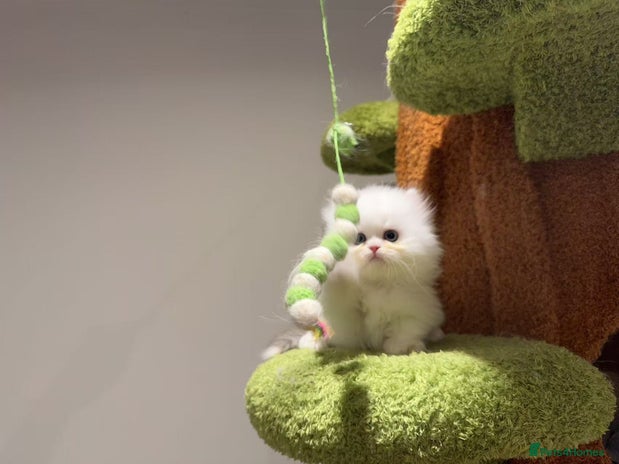
Super stunning & rare Minuet
£2,200
